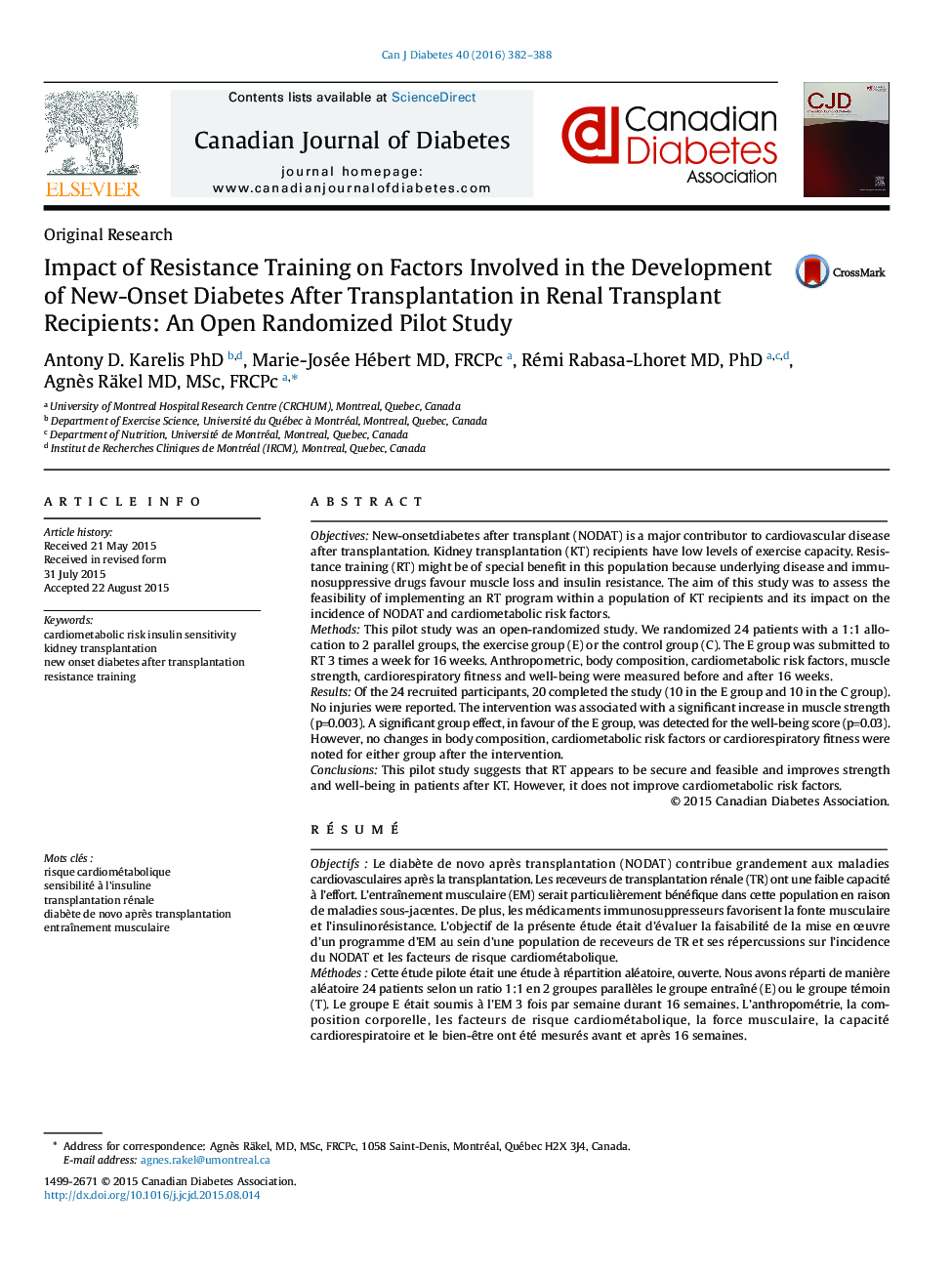| کد مقاله | کد نشریه | سال انتشار | مقاله انگلیسی | نسخه تمام متن |
|---|---|---|---|---|
| 5654667 | 1589327 | 2016 | 7 صفحه PDF | دانلود رایگان |
ObjectivesNew-onsetdiabetes after transplant (NODAT) is a major contributor to cardiovascular disease after transplantation. Kidney transplantation (KT) recipients have low levels of exercise capacity. Resistance training (RT) might be of special benefit in this population because underlying disease and immunosuppressive drugs favour muscle loss and insulin resistance. The aim of this study was to assess the feasibility of implementing an RT program within a population of KT recipients and its impact on the incidence of NODAT and cardiometabolic risk factors.MethodsThis pilot study was an open-randomized study. We randomized 24 patients with a 1:1 allocation to 2 parallel groups, the exercise group (E) or the control group (C). The E group was submitted to RT 3 times a week for 16 weeks. Anthropometric, body composition, cardiometabolic risk factors, muscle strength, cardiorespiratory fitness and well-being were measured before and after 16 weeks.ResultsOf the 24 recruited participants, 20 completed the study (10 in the E group and 10 in the C group). No injuries were reported. The intervention was associated with a significant increase in muscle strength (p=0.003). A significant group effect, in favour of the E group, was detected for the well-being score (p=0.03). However, no changes in body composition, cardiometabolic risk factors or cardiorespiratory fitness were noted for either group after the intervention.ConclusionsThis pilot study suggests that RT appears to be secure and feasible and improves strength and well-being in patients after KT. However, it does not improve cardiometabolic risk factors.
RésuméObjectifsLe diabète de novo après transplantation (NODAT) contribue grandement aux maladies cardiovasculaires après la transplantation. Les receveurs de transplantation rénale (TR) ont une faible capacité à l'effort. L'entraînement musculaire (EM) serait particulièrement bénéfique dans cette population en raison de maladies sous-jacentes. De plus, les médicaments immunosuppresseurs favorisent la fonte musculaire et l'insulinorésistance. L'objectif de la présente étude était d'évaluer la faisabilité de la mise en Åuvre d'un programme d'EM au sein d'une population de receveurs de TR et ses répercussions sur l'incidence du NODAT et les facteurs de risque cardiométabolique.MéthodesCette étude pilote était une étude à répartition aléatoire, ouverte. Nous avons réparti de manière aléatoire 24 patients selon un ratio 1:1 en 2 groupes parallèles le groupe entraîné (E) ou le groupe témoin (T). Le groupe E était soumis à l'EM 3 fois par semaine durant 16 semaines. L'anthropométrie, la composition corporelle, les facteurs de risque cardiométabolique, la force musculaire, la capacité cardiorespiratoire et le bien-être ont été mesurés avant et après 16 semaines.RésultatsParmi les 24 participants recrutés, 20 ont réalisé l'étude (10 du groupe E et 10 du groupe T). Aucune blessure n'a été rapportée. L'intervention a été associée à une augmentation significative de la force musculaire (p=0,003). Un effet de groupe significatif qui favorisait le groupe E a été détecté par le score de bien-être (p=0,03). Cependant, aucun changement dans la composition corporelle, les facteurs de risque métabolique ou la capacité cardiorespiratoire n'a été noté pour l'un ou l'autre groupe après l'intervention.ConclusionsCette étude pilote suggère que l'EM semble être sûr et réalisable, et qu'il améliore la force et le bien-être des patients après la TR. Cependant, il n'améliore pas les facteurs de risque cardiométabolique.
Journal: Canadian Journal of Diabetes - Volume 40, Issue 5, October 2016, Pages 382-388
